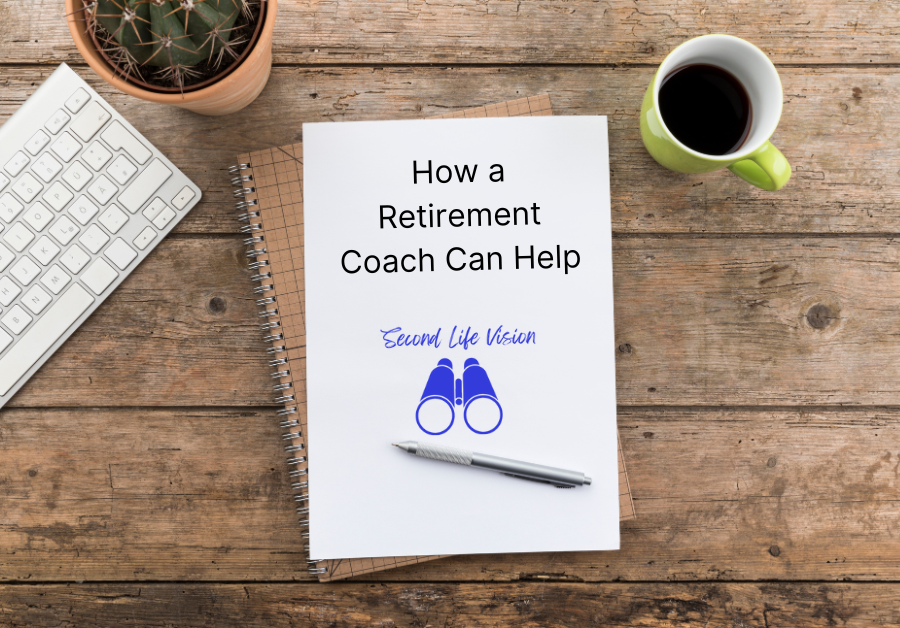One of the questions I hear often is, “Why would someone need a retirement coach?” It’s a fair question. For many years, people have been retiring without the help of a retirement coach. Let’s look at what has changed and how a retirement coach can help you.
The biggest change is that people are living longer so retirement lasts longer. Since 1900, we’ve added 30 years to our lifespan. If you leave your full-time career behind at 60 or 65, you’ll likely have 25 or 30 years left to live. That’s a long time to sit in a rocking chair on the porch—or a lounge chair on the beach. Finding ways to stay mentally and socially engaged can help you make that last third of your life the best of all.
But it takes a little planning…
Why you need a life plan for your best years
Traditional retirement planning has focused only on the money side of things, largely ignoring the mental, social, physical and spiritual aspects of our later years. Money is important, but cash alone won’t give your life meaning and purpose.
Ignoring these other aspects of planning can leave people feeling like something is missing after the honeymoon phase of retirement wears off.
If you’re feeling like you might be ready to say good-bye to your full-time career in the coming years, now’s the time to put your retirement lifestyle plan together. And if you’re already retired, it’s not too late to create the lifestyle you want to live.
Here are the main reasons you may need a retirement lifestyle plan.
Leaving work creates a void
In North American culture, many people define themselves by their work. When they leave their full-time jobs behind, even by choice, it creates a void. Love it or hate it, work adds structure to our daily lives.
Our jobs also give us a sense of purpose, and help us stay mentally and socially engaged. Take that away, and many people feel lost. In extreme cases, the loss of structure and purpose can lead to addiction issues and depression.
Retirement lifestyle planning can help you identify meaningful activities to replace the sense of fulfillment and accomplishment you got from your work.
You’ve got a lot of years to fill
According to the O.E.C.D., a 65-year-old Canadian can expect to live another 22 years. Life expectancy at 65 is fairly consistent across all G20 nations, and it has been trending upwards over the last few decades.
If you work a full-time job, you work at least 2,000 hours a year. Add in the time it takes to get ready for, and commute to, work and you can easily be looking at 2,500 hours or more a year. Multiply that by 22 years and you’ve got over 50,000 hours to fill.
A retirement lifestyle plan can help you explore ideas to keep you busy and active.
Change is stressful
Many people think that retirement will solve all their problems—underestimating the emotional aspect of a major life change. Like other life changes, the transition to retirement can be stressful. In fact, retirement ranks number 10 out of 43 stressful life events according to the Holmes-Rahe Stress Inventory from the American Institute of Stress.
A holistic lifestyle plan for your retirement can reduce your stress by giving you a reason to be excited about your future and creating the confidence that you’ll be able to make a successful transition.
Staying mentally engaged can avoid cognitive decline
Dementia is one of the biggest fears of older adults. Work keeps us mentally and socially engaged, and research has shown that delaying retirement can reduce the risk of developing dementia.
A retirement coach can help you create a plan to replace the mental tasks and challenges from work. That could reduce the risk of cognitive decline in your later years.
Things might not just fall into place
When we’re working, we always wish we had more time to do the things we love to do. That’s why many people approaching the end of their careers think things will just fall into place and retirement will be everything they hope for. That does happen for some people. Others end up feeling lost after taking an initial period to unwind and recharge after leaving the workforce.
A retirement lifestyle plan can help you enjoy that time to unwind and recharge, while feeling excited about what comes next.
How a retirement coach can help
Some people have no trouble creating a retirement lifestyle plan on their own. Others may need the help of a retirement coach to prepare for the transition into retirement life.
A retirement coach follows a structured process to help you explore all aspects of creating a dynamic and rewarding retirement lifestyle.
Contact me to find out how I can help you create your plan.

Comments
2 responses to “How a retirement coach can help you”
Hi Michelle! I think that so many people (including yours truly) focus on the money needed for retirement. However, putting together an actual retirement plan for things that we take for granted while working is a very wise thing to do.
Thank you for providing us with other areas of retirement life we need to think about.
Yes, it’s easy to focus on the money and not give any thought on what you’ll need it for. One of my goals is to increase awareness of the importance of a holistic plan.